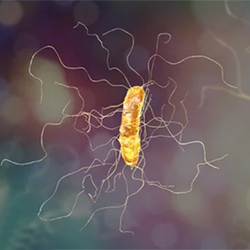By Ethan Covey
Originally published by our sister publication, Infectious Disease Special Edition
Recurrent Clostridioides difficile infection (rCDI) is common, yet few patients have confirmed CDI-specific follow-up appointments after hospital discharge, according to a presentation at the IDWeek 2021 virtual conference (poster 766).

The researchers also found that nearly 50% of patients with rCDI had to be rehospitalized due to their infection.
“CDI is notorious for causing recurrent illness and potentially resulting in rehospitalization,” said lead author Emily Drwiega, PharmD, a second-year infectious diseases pharmacy fellow at the University of Illinois at Chicago (Clin Infect Dis 2012;55(suppl 2):S77-S87). “Both HAI [hospital-acquired infections] and readmissions are of a particular focus by the Centers for Medicare & Medicaid Services, and minimizing both is important.”
Dr. Drwiega and her colleagues conducted a single-center retrospective chart review to determine the frequency of follow-up appointments among patients with CDI and rates of rehospitalization in patients with rCDI. Electronic medical records were reviewed for all hospitalized patients with a positive stool test for C. difficile from January through June 2018.
Among 283 total patients, 43% of whom were immunocompromised, 211 were diagnosed with primary CDI, 43 with CDI colonization and 29 with rCDI.
Only 14.8% of patients had a confirmed follow-up appointment upon discharge from the hospital. The rate of follow-up appointments was only slightly higher (18.5%) among the 27 patients who had rCDI within 90 days of discharge. Of these patients, 44% were rehospitalized for their recurrence. Only two of the patients rehospitalized for rCDI were seen in a follow-up appointment prior to their rehospitalization.
“Minimizing recurrent illness and reducing rehospitalization due to rCDI is important,” Dr. Drwiega said. “Further study is necessary to determine whether a dedicated follow-up appointment, specifically for CDI, would result in decreased rehospitalizations associated with rCDI.”


Please log in to post a comment